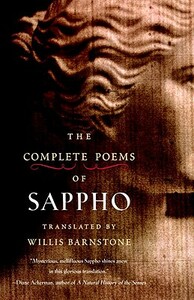Take a photo of a barcode or cover
I read the Loeb Translation of all the Sappho Fragments. I like them, shame they're mostly fragmentary.
one star for the translation, five stars always for sappho’s poetry always
“...sleek afroditi broke me with longing for a boy.” ???
I’ve read this line 100s of times, and this is the first time I’ve read it with reference to a boy
I almost threw my kobo across the room
“...sleek afroditi broke me with longing for a boy.” ???
I’ve read this line 100s of times, and this is the first time I’ve read it with reference to a boy
I almost threw my kobo across the room
fast-paced
emotional
lighthearted
reflective
medium-paced
My first time reading Sappho and I'm more interested in the woman behind the few words collected here.
This collection, while complete, is still not. These translated words are but pieces of what are larger poems or songs. I love that they talk about the time in which they were written as well as the gods that she favored or in turn she believed favored her.
These are the remnants of what the world has left of Sappho and in between her words, there's a tenderness, a longing, a quietness that I don't find in today's modern poetry.
This collection, while complete, is still not. These translated words are but pieces of what are larger poems or songs. I love that they talk about the time in which they were written as well as the gods that she favored or in turn she believed favored her.
These are the remnants of what the world has left of Sappho and in between her words, there's a tenderness, a longing, a quietness that I don't find in today's modern poetry.
Being translated into English, I"m sure a lot of the impactfulness of Sappho's poetry was lost in translation, but still, there were fragments that particularly struck me.
"as the sweet apple reddens on a high branch/high on the highest branch and the apple pickers forgot-/no, not forgot: were unable to reach"
"as honey: desire is poured upon your lovely face"
Like... damn, Sappho. Get it!
"as the sweet apple reddens on a high branch/high on the highest branch and the apple pickers forgot-/no, not forgot: were unable to reach"
"as honey: desire is poured upon your lovely face"
Like... damn, Sappho. Get it!
What lovely poetry from an incredibly talented woman. It's beyond a shame how much of her work was destroyed. There's something about her words- how they convey such strong, specific human emotions that transcend time. The love poems clearly addressed to women are absolutely lovely, as well as the imagery of nature.
Very interesting to read this back to back with the Carson translation. There were things I liked better about this version (of course it has one of the new poems in it), and things I felt Carson added to more. Really, it's well worth reading both of them.
I found that Carson's translations were a little more poetic, but Barnstone often had clearer meaning, and sometimes the plainer language felt truer to me. I really liked how Carson included the original Greek to show what we were extrapolating from, and had all the brackets and ellipses in the English translation, because it was very educational, but it also, for me distracted a bit from the poetry, whereas Barnstone stripping most of that made Sappho more approachable.
This edition has a nice introduction about how Sappho has been interpreted through history, with lots of quotes and examples, and in edition to the usual ancient quotes includes some 20th-century poetry about her as well.
I wasn't sure why Barnstone chose to organise the poems by theme rather than fragment number, though it mostly worked. However, the notes at the back were still by fragment number, which meant a lot of flipping back and forth trying to find things. Carson's notes were generally better anyway.
If you had to read only one translation, I would be hard pressed to decide which of the two, but might come slightly in favour of Carson.
I found that Carson's translations were a little more poetic, but Barnstone often had clearer meaning, and sometimes the plainer language felt truer to me. I really liked how Carson included the original Greek to show what we were extrapolating from, and had all the brackets and ellipses in the English translation, because it was very educational, but it also, for me distracted a bit from the poetry, whereas Barnstone stripping most of that made Sappho more approachable.
This edition has a nice introduction about how Sappho has been interpreted through history, with lots of quotes and examples, and in edition to the usual ancient quotes includes some 20th-century poetry about her as well.
I wasn't sure why Barnstone chose to organise the poems by theme rather than fragment number, though it mostly worked. However, the notes at the back were still by fragment number, which meant a lot of flipping back and forth trying to find things. Carson's notes were generally better anyway.
If you had to read only one translation, I would be hard pressed to decide which of the two, but might come slightly in favour of Carson.
I adore Sappho, but I did not really care for this edition. The editor seemed to leave a lot out, especially a few of her better known poems that I have read in class—how upsetting! I bought another addition of Sappho’s poetry to read at a later date, in hopes that I will enjoy that one more.
Sappho’s poetry in general is so impactful, emotional, and powerful still though. It is crazy to me that the same feelings, thoughts, and ideas from hundreds of years ago resonate just the same today. I guess that could be a testament to the stability of humans over time.
Sappho’s poetry in general is so impactful, emotional, and powerful still though. It is crazy to me that the same feelings, thoughts, and ideas from hundreds of years ago resonate just the same today. I guess that could be a testament to the stability of humans over time.







